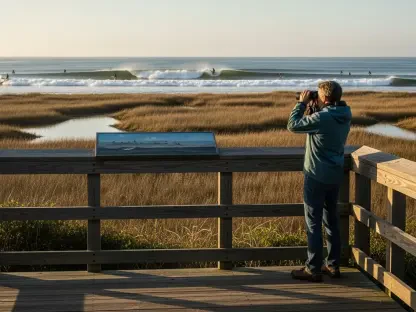In the bustling heart of Edinburgh, where the annual Fringe Festival draws thousands of visitors from around the globe, a quiet revolution is taking place at one of the city’s most prominent venues. Surgeons Quarter, the commercial arm of the Royal College of Surgeons of Edinburgh, has emerged as a trailblazer in sustainability with a series of forward-thinking environmental initiatives. Known for hosting a myriad of performances during the festival, this venue is now capturing attention not just for its cultural offerings but for its bold commitment to reducing waste and enhancing the visitor experience. At the forefront of these efforts is a pioneering reusable cup policy, designed to tackle the pervasive issue of single-use plastics. This initiative, alongside other green practices, positions Surgeons Quarter as a leader in redefining how event spaces can balance operational demands with ecological responsibility, setting an inspiring example for the hospitality industry at large.
Driving Environmental Change at the Fringe
Cutting Waste with Reusable Solutions
At the core of Surgeons Quarter’s environmental strategy during the Edinburgh Festival Fringe lies an innovative $2 reusable cup policy that challenges the throwaway culture prevalent at large events. Festivalgoers pay a modest one-time fee to receive a durable, dishwasher-safe cup, crafted as a souvenir to commemorate their experience. Each time they return for another drink, the used cup is exchanged for a fresh, clean one at no additional cost, ensuring hygiene while slashing the reliance on disposable plastics. This approach significantly lowers the carbon footprint associated with single-use items, which often end up in landfills or as litter. By transforming a mundane necessity into a keepsake, the venue not only addresses waste reduction but also engages attendees in a tangible sustainability effort, encouraging them to rethink their consumption habits during one of the world’s largest arts festivals.
Building on a Broader Green Legacy
Beyond the festival grounds, Surgeons Quarter’s dedication to environmental stewardship is evident in its long-standing practices at the affiliated Ten Hill Place Hotel, a consistent holder of the Green Tourism Gold Award for 17 years. The hotel has eliminated single-use plastic bottles from guest rooms, preventing over 100,000 bottles from entering waste streams, and instead offers guests Scottish wildflower seed packets to foster biodiversity in personal spaces. Significant investments have also been made in eco-friendly infrastructure, such as electric vehicle charging stations and staff uniforms crafted from recycled plastic bottles, each preventing dozens of bottles from reaching landfills. These efforts reflect a comprehensive commitment to sustainability that permeates every facet of operations, demonstrating that environmental responsibility can be seamlessly integrated into hospitality without compromising service quality or guest satisfaction.
Championing People and Community
Supporting Staff as a Core Value
Equally important to Surgeons Quarter’s mission is a deep-rooted focus on employee well-being, recognizing that sustainability extends beyond the environment to the people who power the organization. Accredited by the Living Wage Foundation, the venue ensures that all staff members, regardless of age, receive compensation above the standard Living Wage, providing financial security. Additionally, a remarkable 7.5% of each employee’s salary is contributed toward their pension, far exceeding the legal minimum and underscoring a commitment to long-term welfare. As articulated by Managing Director Scott Mitchell, enhancing the planet, guest experience, and workplace environment are interconnected goals. This philosophy fosters a supportive culture that not only benefits employees but also enhances the overall quality of service delivered to festival attendees and hotel guests.
Extending Impact Through Charitable Ties
The reusable cup initiative at the Fringe Festival also serves as a conduit for broader social impact, with a portion of the proceeds allocated to meaningful causes that resonate locally and globally. Funds support carbon offsetting projects through partnerships with environmental organizations, alongside contributions to a Supper Soirée event benefiting a homelessness charity focused on combating isolation. Further donations aid the Royal College of Surgeons of Edinburgh in its mission to improve patient outcomes worldwide. This multi-layered approach ensures that environmental initiatives are not standalone efforts but are woven into a fabric of community and global welfare. By aligning business practices with social good, Surgeons Quarter illustrates how hospitality venues can play a pivotal role in addressing societal challenges while pursuing ecological goals.
Leading the Way for Sustainable Hospitality
Inspiring Industry-Wide Transformation
Surgeons Quarter’s initiatives at the Fringe Festival and beyond signal a pivotal shift in the hospitality and events sector, where sustainability is increasingly becoming a non-negotiable value rather than an optional add-on. The upfront investment in programs like the reusable cup policy, despite initial costs, highlights a focus on long-term environmental and social benefits over immediate financial returns. With cups featuring designs of iconic venue imagery, they are positioned as cherished mementos, aiming to shift public perception and minimize resistance to the small fee. This strategy not only reduces waste but also builds a bridge between consumer behavior and eco-conscious practices, potentially influencing other venues to adopt similar measures. The example set here could ripple through the industry, encouraging a collective move toward greener event management.
Reflecting on a Path Forward
Looking back, Surgeons Quarter’s efforts during the Edinburgh Festival Fringe marked a significant moment in blending sustainability with memorable experiences. The reusable cup policy, paired with holistic green practices at Ten Hill Place Hotel, demonstrated that reducing ecological impact could go hand in hand with enhancing guest engagement. Investments in staff welfare and charitable contributions further cemented a model of responsibility that extended beyond mere environmentalism. As challenges like public acceptance of small fees were navigated, the minimal cost proved a worthy trade-off for the substantial benefits achieved. Moving forward, the success of these initiatives offers a roadmap for other venues to follow, suggesting that integrating sustainability into core operations can yield both practical results and positive societal change. This approach, refined through thoughtful implementation, invites the industry to explore innovative solutions that prioritize both planet and people for a more sustainable future.









